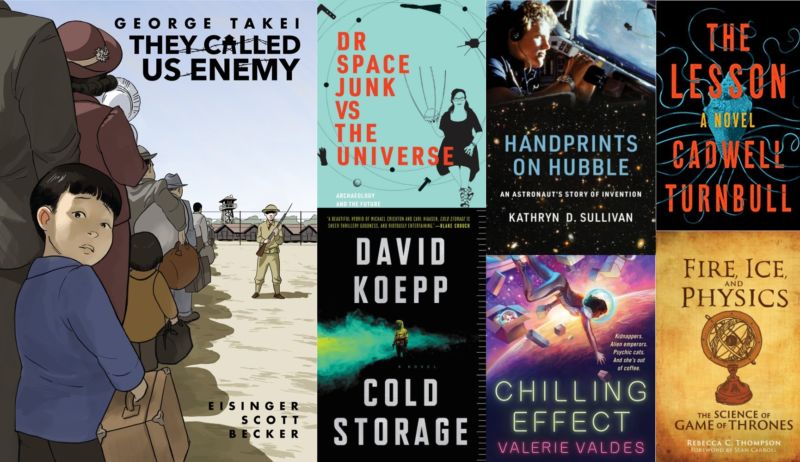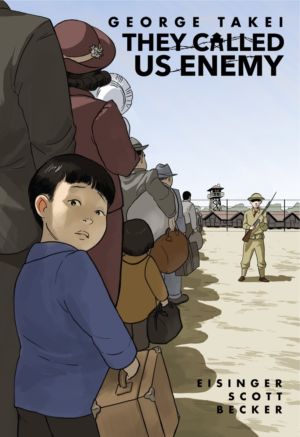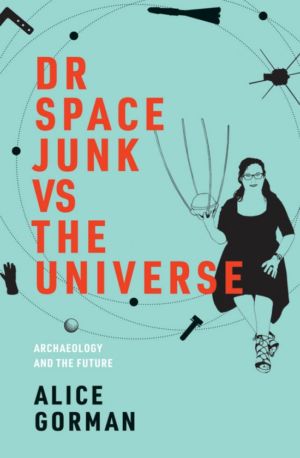
Authors, publishers, and book nerds converge on New York City at the end of May each year for Book Expo America, and this year Ars was there to scope out some stories. The convention showcases books of all kinds—fiction, nonfiction, sci-fi, fantasy, historical fiction, YA, graphic novels, comics, and everything in between—making it an excellent opportunity to learn more about already anticipated titles and discover new releases debuting in the coming months.
After talking to numerous publishers and hearing a few authors speak (including Star Trek’s George Takei—check out the first pick in our list), we’re highlighting a few of our most anticipated reads for the rest of 2019. Most fit into the nonfiction, sci-fi, and fantasy genres, but some bleed into other genres as well. Add to your TBR list, e-reader, library app, or Audible wish list so you don’t miss any of these exciting upcoming releases.
Note: Ars Technica may earn compensation for sales from links on this post through affiliate programs.
They Called Us Enemy by George Takei, Justin Eisinger, Steven Scott, Harmony Becker (artist)

Most know George Takei for his work in Star Trek or for his witty, progressive comebacks on social media. But many may not know about the Japanese-American actor and activist’s early life—one that was defined by a painful, difficult period for his whole family. In They Called Us Enemy, Takei retells his family’s story of life in American concentration camps during World War II, when the country was rounding up and imprisoning thousands of Japanese Americans as tensions between the US and Japan escalated.
As a young boy, Takei didn’t understand the meaning behind his family’s sudden “vacation” to a place called Arkansas. As an adult, Takei reflects back on that time, which was full of discovery through his child eyes but full of anxiety and anguish for adults like his parents. Speaking to a crowd at Book Expo, Takei recalled how terrifying and angering that time was for his father. The elder Takei bore most of the burden of his family’s imprisonment—despite his desire to speak up and fight back, he knew that remaining compliant was the best course of action to keep himself and his family alive. They Called Us Enemy promises to be both a sobering look into a difficult period in American history and an enlightening glimpse into Takei’s early life.
The Lesson by Cadwell Turnbull
This debut novel brings a sci-fi twist to the US Virgin Islands. The Lesson follows the residents of Water Island who have been living with a mysterious alien race called the Ynaa for the past five years. What exactly the Ynaa are “researching,” no one really knows. The aliens are mostly benevolent, but any overstepping of boundaries is met with furious anger—thus complicating the relationship between Water Island’s inhabitants and their new neighbors.
Everything takes a turn when a young boy is killed by the Ynaa. His death sends three families into chaos, and they are forced to face a conflict they never dreamed of. Told in multiple points of view, including that of an alien leader, The Lesson promises a unique twist on sci-fi’s alien-invasion trope in addition to commentary on how humans have treated (and continue to treat) those who are different from them.
Dr. Space Junk vs the Universe: Archeology and the Future by Alice Gorman

The study of space artifacts is Alice Gorman’s thing. In Dr. Space Junk vs the Universe, the space archeologist now affectionately known as Dr. Space Junk takes readers on a journey to discover the many things humans have left in the cosmos during their space travels. Space enthusiasts may know this already, but newbies will be intrigued to find out that space holds many weird yet innocuous objects that humans have left behind either intentionally or unintentionally. Similarly, many objects have careened down onto Earth from space, and Gorman looks into those as well—everything from dead satellites, forgotten zip ties, a recognizable American flag, and more.
Gorman also explains how she got into and became a pioneer of space archeology. From a young age growing up on a farm in Australia, Gorman was fascinated by both the very new and the very old—things like space travel and fossils—and that led her to a career in archeology. But craving even more science in her life, she gravitated toward astrophysics, space, and the like—eventually, she carved out her own area of expertise in the world of discovery. Dr. Space Junk vs the Universe will be a delightful and educational read for anyone interested in the space oddities and how artifacts from the past can tell us a lot about our future.
Monster, She Wrote: The Women Who Pioneered Horror and Speculative Fiction by Lisa Kröger and Melanie R. Anderson
Many mischaracterize science fiction, horror, speculative fiction, and similar genres as “male-dominated,” but those genres would not be as they are today without seminal female writers. Monster, She Wrote takes a look at some of the most important writers in the horror and speculative fiction spaces who often get overlooked. Mary Shelley may get all of the accolades for Frankenstein, but plenty of other female writers have produced genre-defining works that influenced revered male writers like H.P. Lovecraft.
Margaret Cavendish, Violet Paget, and Gertrude Barrows Bennett are just a few female writers who get their much-deserved moment in the spotlight in Monster, She Wrote, and the book dives into their under-appreciated published works as well as their personal lives. In addition to highlighting writers of the past, the book also takes a look at up-and-coming writers in the horror and speculative genres that would not be as successful or as challenging as they are without the work of female writers that came before them.
https://arstechnica.com/?p=1513935

